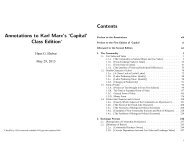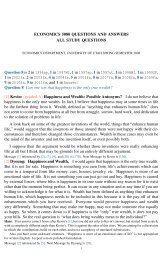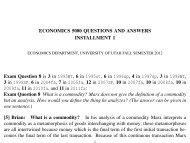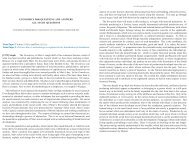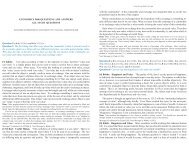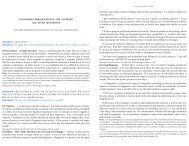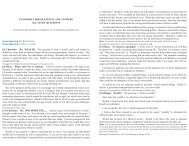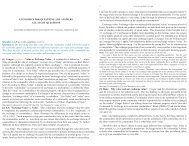Question 1 What did Marx mean with his formu - University of Utah
Question 1 What did Marx mean with his formu - University of Utah
Question 1 What did Marx mean with his formu - University of Utah
You also want an ePaper? Increase the reach of your titles
YUMPU automatically turns print PDFs into web optimized ePapers that Google loves.
U <strong>of</strong> <strong>Utah</strong> Econ 5080 2005fa 83<br />
<strong>Question</strong> 125 If the physical thing is not the commodity but only the “body” or the “bodily<br />
form” <strong>of</strong> the commodity, how should then the commodity itself be defined?<br />
[222] Mason: I believe that what <strong>Marx</strong> is saying that “the body <strong>of</strong> the commodity, i.e.,<br />
the commodity as a physical object,” is <strong>of</strong> no real value to the producer at all until he can<br />
exchange it <strong>with</strong> a consumer. And t<strong>his</strong> is where I believe the commodity is defined. But<br />
it is not defined until the consumer and the producer come together and agree upon the<br />
value <strong>of</strong> the commodity. It is indeed a social entity. For example, if you make 5 pairs<br />
<strong>of</strong> shoes and no one buys them, they will just sit there as some leather, rubber soles, and<br />
laces. But when a consumer comes and buys them, now you can take that money and buy<br />
some wheat for example from the money that you obtained from your commodity. The<br />
shoes now have become much more than just some leather, rubber soles, and laces. The<br />
shoes itself had no significance to the producer, “because the commodity producers do not<br />
produce commodities for the sake <strong>of</strong> their use values (they themselves don’t need them)”<br />
(page 70). And t<strong>his</strong> is where I believe the commodity is defined. A commodity is a <strong>mean</strong>s <strong>of</strong><br />
money making and survival for the producer. Through these commodities you can achieve<br />
purchasing power, thus I believe that they in turn become your livelihood, “useful objects and<br />
carriers <strong>of</strong> value” (page 70). Because when you trade these commodities <strong>with</strong> a consumer<br />
they become, as <strong>Marx</strong> says, “tw<strong>of</strong>old.” They are objects <strong>of</strong> utility and also, at the same time,<br />
depositories <strong>of</strong> value. And t<strong>his</strong> is what makes the commodities much more valuable than<br />
just their use-value.<br />
Hans: T<strong>his</strong> is good, but you should have taken a little more time improving the presentation <strong>of</strong> your thoughts.<br />
Message [222] referenced by [288]. Next Message by Mason is [505].<br />
[228] Thugtorious: graded A– <strong>What</strong> the heck is a “commodity”? The phrase “commodity”<br />
has been used since the first page <strong>of</strong> Kapital, but we really have yet to define the<br />
word itself. We have a working definition that <strong>Marx</strong> adds bits and pieces to throughout<br />
the pages. As the question states, a “commodity” is not the physical object or thing. T<strong>his</strong><br />
is merely a vessel, or conduit for all <strong>of</strong> the elements embedded in the production process.<br />
Not physical elements, but: labor power, abstract labor, use-value, exchange-values, formvalues,<br />
etc. The physical object is the carrier <strong>of</strong> these elements. So, we yet again are back<br />
to the question: what is a commodity? Well, in my eyes, the idea <strong>of</strong> “commodity” is the<br />
abstract summation <strong>of</strong> all <strong>of</strong> these things; a “commodity” itself is more <strong>of</strong> an idea rather<br />
than a concrete object. For instance, a wheel in pre<strong>his</strong>toric society was an object <strong>with</strong> a<br />
use, but was not a “commodity.” However, you transplant that same object into capitalistic<br />
production and exchange, the object then embodies all <strong>of</strong> the elements <strong>of</strong> production and the<br />
relations <strong>of</strong> that mode <strong>of</strong> production and society; the object becomes a “commodity.”<br />
In reading Kapital, and other <strong>Marx</strong>ian texts, <strong>Marx</strong> looked more towards <strong>mean</strong>ings, true<br />
significance, and what is beneath the exterior rather than the exterior itself. For example,<br />
<strong>with</strong> language, when you say a word, you might not necessarily comprehend what that word<br />
truly <strong>mean</strong>s, symbolizes, connotes. However, the person hearing that word is strongly influenced<br />
by those mere vibrations <strong>of</strong> your vocal chords. Why? That is where <strong>Marx</strong> begins <strong>his</strong><br />
analysis. So, it isn’t necessarily the word “commodity” or the object itself that matters, it is<br />
what the word <strong>mean</strong>s, what’s beneath the surface, and what went into producing said object;<br />
that is a “commodity.”<br />
Hans: A commodity is something quite concrete; it is not an idea.<br />
84 2005fa Econ 5080 U <strong>of</strong> <strong>Utah</strong><br />
Next Message by Thugtorious is [232].<br />
[252] Camhol: The commodity itself should be defined as the consumer conversion value,<br />
since that is what the consumer does is convert it from its physical form to something their<br />
self-interest deems valuable. Ex: Petroleum in its physical form is the liquid viscous natural<br />
form, to the conversion energy form <strong>of</strong> horsepower in the car for movement. Ex2: An apple<br />
in its physical form is converted twice, once for its emotional pleasure to the consumer and<br />
then converted again for the sugar energy made by the body for movement. It is because <strong>of</strong><br />
a “what, how, why” effect (<strong>mean</strong>ing what is converted, how it is converted, and why it is<br />
converted) that the value is determined in the market <strong>of</strong> consumers<br />
Hans: The world is not as connected as you seem to think. You are not paying the grocery store for apples because<br />
your body metabolizes apples into energy. In <strong>Marx</strong>’s theory, you are paying for apples because human labor has<br />
been used to produce these apples.<br />
Next Message by Camhol is [591].<br />
[288] JJ: graded A <strong>What</strong> a commodity is. A commodity is a commodity when it can be<br />
exchanged for something other than itself. Mason in [222] rightly recognizes that producers<br />
do not produce commodities for their use-values, but for their value (i.e. their exchange<br />
values). T<strong>his</strong> exchange relationship is crucial in defining its own identity as a commodity. No<br />
doubt, a commodity has physical characteristics or a “bodily form”, t<strong>his</strong> is just the interface<br />
and not the commodity itself. <strong>What</strong> matters to the producer is that he “embed(s) abstract<br />
human labor” into <strong>his</strong> commodity, so that he may obtain “access to the things he needs” (pg.<br />
72).<br />
Hans: I think we have beaten the horse to death now; if anyone else submits an answer to t<strong>his</strong> question, I expect<br />
them to say something really new.<br />
Next Message by JJ is [491].<br />
Multiple Choice <strong>Question</strong> 127 When <strong>Marx</strong> writes that the commodity needs a value form<br />
he <strong>mean</strong>s by t<strong>his</strong>:<br />
(a) Commodities would not have value if they could not be sold.<br />
(b) In capitalism the value <strong>of</strong> a person is determined by how many commodities he or she<br />
has.<br />
(c) Surface relations must exist which allow the practical agents, especially the producers <strong>of</strong><br />
the commodity, to get access to (benefit from) the value in the commodity.<br />
(d) Many commodities could not be sold at their given prices if they <strong>did</strong> not have fancy<br />
packaging etc. suggesting to the buyers that they are something valuable.<br />
[728] MK: C<br />
Next Message by MK is [729].<br />
<strong>Question</strong> 128 is 127 in 2004fa, 151 in 2008fa, 157 in 2009fa, 166 in 2010fa, and 996 in<br />
2012fa:<br />
<strong>Question</strong> 128 If a commodity is only produced because <strong>of</strong> its value, why <strong>did</strong> <strong>Marx</strong> not say<br />
that commodities come to the world in the form <strong>of</strong> values?<br />
[213] Demosthenes: graded A The Commodity is Born. To begin, a reminder: what<br />
<strong>Marx</strong> <strong>did</strong> say, was that “Commodities come into the world in the form <strong>of</strong> use-values or<br />
articles, as iron, linen, corn etc. (138:1).”



